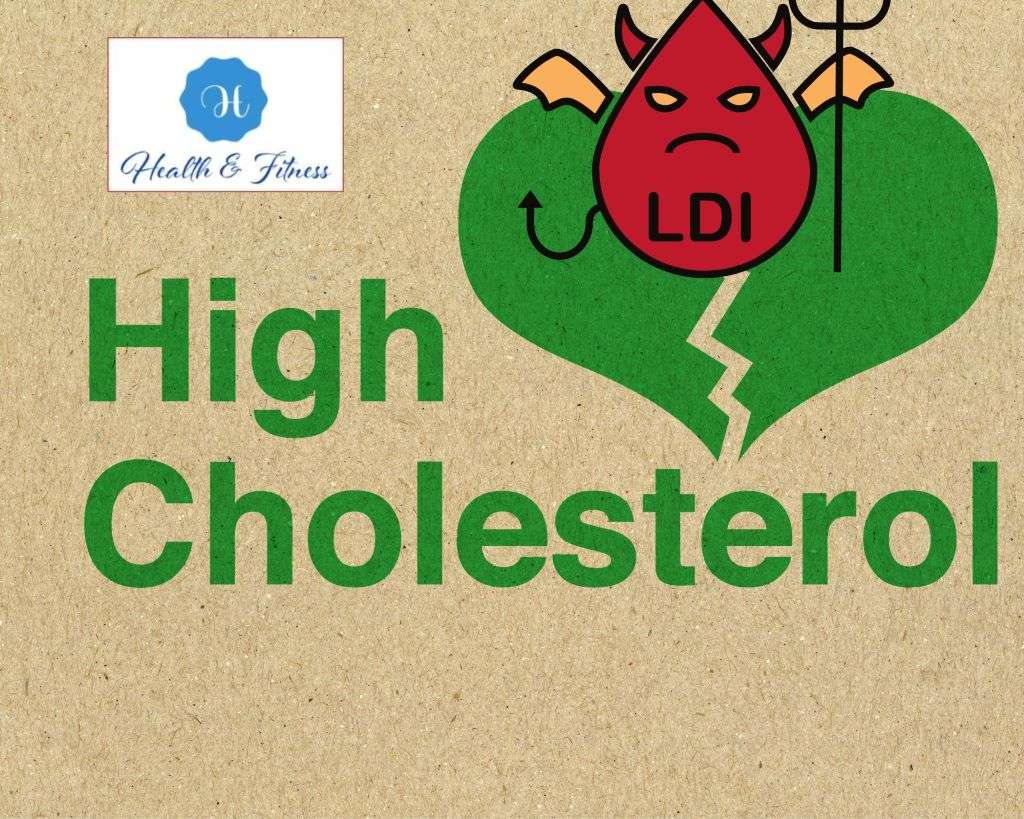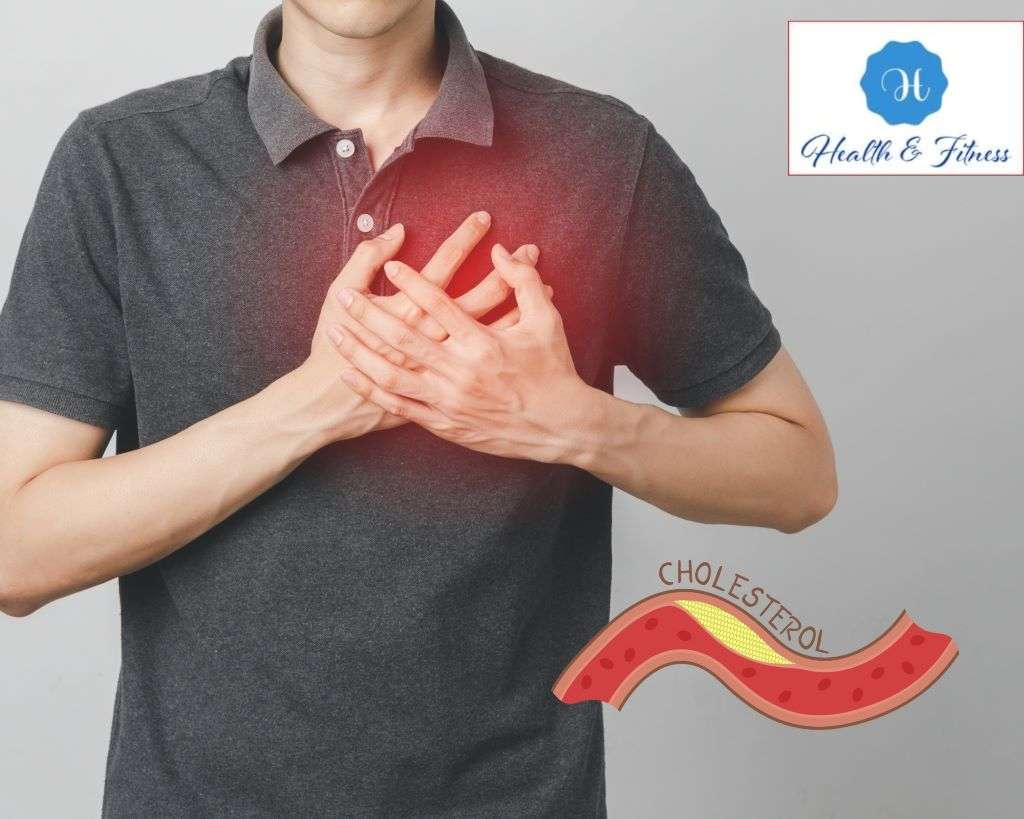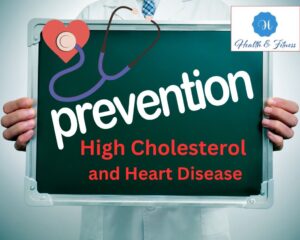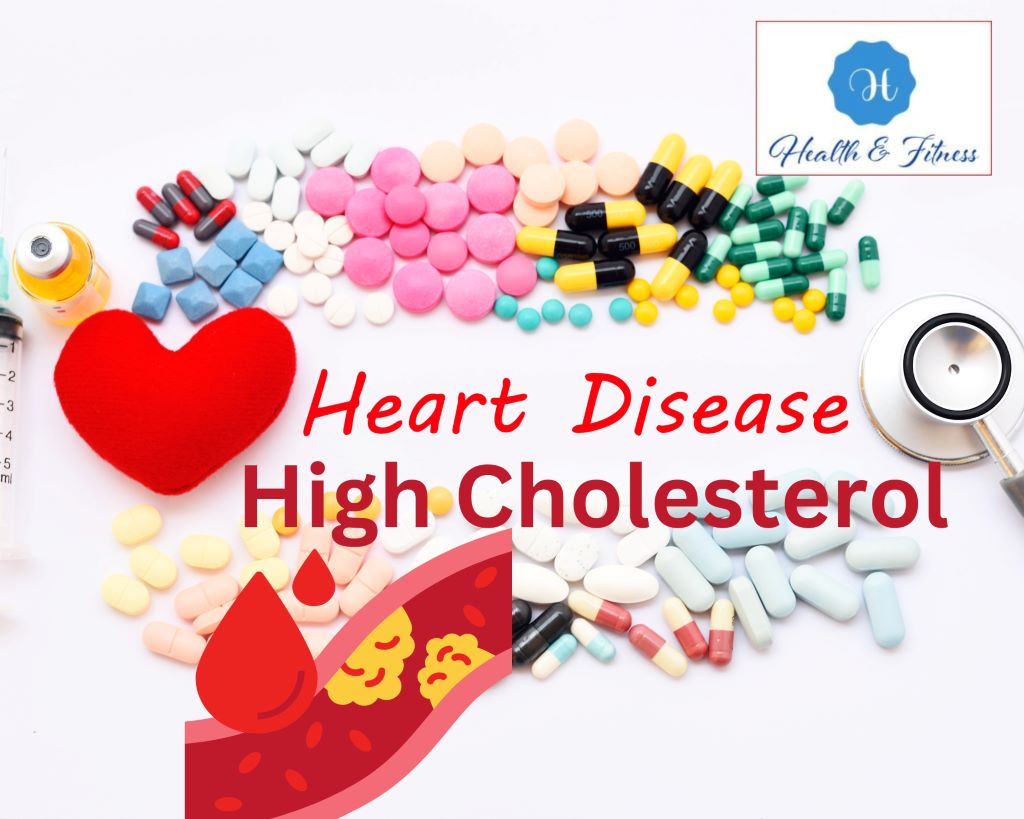Top 10 Tips for Heart Disease with High Cholesterol Facts Problem & Solution
Discover the Top 10 Tips for Managing Heart Disease and Cholesterol. Get Facts, Solutions, and Take Control of Your Heart Health.
Heart Disease Cholesterol To stay in good health, it is necessary to have essential information on the connection between high cholesterol and heart disease. Cholesterol is a waxy, fat-like molecule in all cells. It’s needed to make hormones, vitamin D, and digest food. Yet, raised cholesterol levels can cause heart disease. Consistently high cholesterol levels are a significant contributor to the development of cardiovascular disease.
Cardiovascular disease encompasses coronary artery disease, cardiac arrest, and stroke. According to the CDC, heart disease kills more than 650,000 Americans annually. We will discuss the correlation between high cholesterol and cardiovascular disease and strategies for preventing these conditions. Whether you’re lowering your cholesterol levels or keeping your heart healthy, it’s essential to recognize the link between the two.
So, let’s go in and find out everything we can about high cholesterol and cardiovascular disease.
Precisely what is High Cholesterol?

Lipoproteins transport cholesterol throughout the circulatory system and two types of lipoproteins can perform this function: low-density lipoprotein (LDL) and high-density lipoprotein (HDL). LDL is the “bad” cholesterol because it can accumulate in the artery walls and harden into plaque, increasing the risk of atherosclerosis and cardiovascular disease. HDL, on the other hand, is considered “good” since it aids in clearing the circulation of excess cholesterol and delivering it to the liver for processing.
Too much bad (LDL) cholesterol in the blood causes high cholesterol. Among the many causes of this are:
- An unhealthy diet that is high in saturated and trans fats
- Lack of physical activity
- Obesity or being overweight
- Smoking
- Excessive cholesterol runs in the family
Unfortunately, many people with excessive cholesterol have no apparent symptoms. A blood test is the only foolproof method of diagnosing high cholesterol levels. Your doctor may suggest a cholesterol screening as part of a routine checkup if you have risk factors for heart disease.
Many modifications to your daily routine can significantly affect lowering high cholesterol.
- Saturated and trans-fat-free diets boost cardiovascular health.
- Exercising regularly
- Quitting smoking
- Losing weight if you are overweight
In some cases, medication may be necessary to lower cholesterol levels. Your doctor can create a personalized treatment plan.
How High Cholesterol Contributes to Heart Disease
High cholesterol can lead to the development of cardiovascular disease by contributing to the buildup of plaque in the arteries. Plaque is a thick sludge of fat, cholesterol, and calcium that can build up inside your artery walls and stop blood from getting to your heart.
The heart has to exert more effort to pump blood through arteries that have become narrow or blocked because of plaque accumulation. This can lead to angina, chest pain, or discomfort and raise the risk of a heart attack or stroke. Here are the steps by which high cholesterol contributes to the development of heart disease:
- High LDL cholesterol levels in the blood can cause plaque formation in the artery’s walls.
- Over time, the plaque can grow and narrow the arteries, restricting blood flow to the heart.
- The heart’s lack of oxygen and nutrients can cause chest pain or discomfort (angina).
- A heart attack can occur if the plaque ruptures and forms a blood clot that limits blood flow to the heart.
- Sometimes, the blood clot can also travel to the brain and cause a stroke.
The process of plaque buildup in the arteries can take years or even decades, so it is essential to monitor your cholesterol levels regularly and take steps to lower them if necessary. High blood pressure is another risk factor for cardiovascular disease, diabetes, family history, and age.
If you have any of these risk factors, working with your doctor to manage them and reduce your risk of heart disease is essential.
Symptoms and Diagnosis of High Cholesterol and Heart Disease

They rarely appear until the disease has progressed severely. However, there are some signs and symptoms you should be aware of. Here are some of the most common symptoms of high cholesterol and heart disease:
1- Most heart patients experience chest pain.
Tightness may occur, and pressure or squeezing sensation in your chest; this pain may radiate to your shoulders, arms, neck, jaw, or back.
2- Shortness of breath:
When the heart fails to pump enough blood, the body experiences symptoms such as shortness of breath and difficulty breathing, even when you’re resting.
3- Fatigue:
If your heart is weak or damaged, you may feel tired or weak, even if you haven’t been very active.
4- Dizziness or lightheadedness:
If your blood pressure is too low, you may feel dizzy or lightheaded, especially when you stand up from a sitting or lying position.
5- Nausea or vomiting:
You may feel nauseous or vomit if your heart isn’t functioning correctly.
6- High cholesterol levels:
A blood test can reveal Raised cholesterol despite no outward signs of the condition. One factor that may lead your doctor to recommend a cholesterol screening is having a family history of high cholesterol or heart disease.
It’s important to note that many other conditions can cause these symptoms; not all people with raised cholesterol or heart disease will experience them. If you’re experiencing these symptoms, you must talk to your doctor to determine the underlying cause and receive appropriate treatment.
Additionally, If you have high blood pressure, diabetes, or other risk factors for cardiovascular disease, you may want to consider lowering your cholesterol. Or a family history of the condition, it’s essential to get regular checkups and screenings to monitor your heart health. If you experience any of these symptoms, it is essential to see a doctor immediately.
Your doctor may recommend tests to diagnose cardiovascular disease, such as
- The Electrocardiogram (ECG or EKG) is a test that records the heart’s electrical activity and can identify irregularities in the heart’s structure or rhythm.
- Echocardiogram: This test uses sound waves to scan the heart and diagnose valve or chamber issues.
- Stress test: Detecting blockages or other issues with blood flow to the heart; this test evaluates cardiac activity during exercise.
- Coronary angiography: This test uses dye and X-rays to visualize the inside of the coronary arteries and can detect blockages or other problems.
If you are diagnosed with heart disease, your doctor will work with you to develop a treatment plan.
This may include lifestyle changes, medication, or procedures to open blocked arteries or repair damaged heart tissue.
Preventing High Cholesterol and Heart Disease

It is possible to lower one’s chance of developing high cholesterol and cardiovascular disease by adjusting one’s lifestyle. The following are some things you can do:
1- Eat a heart-healthy diet:
Research has demonstrated that consuming a diet abundant in fruits, vegetables, and whole grains while limiting saturated and trans fats can lower cholesterol levels and diminish the likelihood of developing cardiovascular disease. The following are examples of nutritious eating choices:
- Low-quality fish oil and Omega-3 fatty acids, abundant in fish like salmon and tuna, have been shown to reduce the risk of cardiovascular disease.
- Nuts, such as almonds and walnuts, are high in healthy fats and fiber that can help lower your cholesterol levels.
- Whole grains, such as brown rice and quinoa, are fiber-rich and can help lower cholesterol levels.
- Fruits and vegetables, which are low in calories and high in fiber, vitamins, and minerals, can help improve your overall health.
It’s essential to limit your intake of saturated and trans fats, which can raise your LDL cholesterol levels. Foods to avoid or limit include:
- Red meat is high in saturated fat.
- Fried foods are often cooked with trans fats.
- Processed foods can be increased in both saturated and trans fats.
2- Frequent exercise lowers LDL cholesterol and improves heart health.
Exercise for at least 30 minutes at a moderate level most days. Some examples of moderately complex workouts are:
- Brisk walking
- Cycling
- Swimming
- Dancing
- Gardening
If you’re new to exercise, accumulate your workouts’ intensity and duration.
You can also try incorporating strength training exercises, such as lifting weights, into your routine to help build muscle and boost metabolism.
3- Keep your weight at a healthy level.
Being overweight can make you more likely to have high blood cholesterol or heart disease.
Even if you only lose weight, your cholesterol levels will go down, and your risk will go down. To keep your weight at a healthy level, you can:
- Eat a balanced, low-calorie diet
- Exercise regularly
- Get enough sleep
- Reduce stress
4- Quit smoking:
One of the leading causes of high cholesterol and an increased risk of cardiovascular disease is smoking. Stopping smoking improves health and lowers cardiovascular disease risk. Your doctor can provide resources and support to help you quit smoking, such as nicotine replacement therapy or counselling.
5- Manage stress:
Chronic stress can increase your risk of cardiovascular disease. Finding ways to manage stress, such as through exercise, relaxation techniques, or counselling, can help improve your heart health. Some stress management techniques you can try include:
- Deep breathing
- Meditation
- Yoga
- Massage
- Spending time with loved ones
6- Understand your family history:
You may, too, if your family has high cholesterol or heart disease. Talk to your doctor about how you can manage your risk. They may recommend more frequent cholesterol screenings or other tests to monitor your heart health.
7- Medications:
Doctors often prescribe medications besides lifestyle adjustments where the patient’s cholesterol levels or cardiovascular disease cannot be brought under control. Stations, bile acid sequestrants, niacin, and vibrates are the only drugs used to treat excessive cholesterol. Your physician may suggest medications to assist in reducing cholesterol levels or controlling other risk factors for congestive heart failure.
Some medications commonly used to treat high cholesterol and congestive heart failure include:
- Statins: These medications function by obstructing a substance required by your body to produce cholesterol, thus assisting in reducing your LDL cholesterol levels.
- Blood pressure medications: If you have high blood pressure, your doctor may prescribe medications to help lower it and reduce your risk of cardiovascular disease.
- Aspirin: Taking low-dose aspirin daily can help
- Surgery: In some cases, surgery may be necessary to treat heart disease. This includes procedures such as angioplasty and stenting, heart procedures like bypass surgery, and valve replacement is examples.
- Regular checkups: It’s essential to get regular checkups and screenings to monitor your heart health, especially if you have abnormal cholesterol levels or cardiovascular disease risk factors. Your doctor may recommend blood tests, electrocardiograms, stress tests, or other diagnostic tests to assess your heart health.
Prevention is crucial for abnormal cholesterol levels and cardiovascular disease. You can lessen your likelihood of having these diseases by adopting a healthier lifestyle and scheduling regular checkups. Talk to your doctor about your risk factors and the best strategies to prevent and treat high blood cholesterol and cardiovascular disease.
What the Research Says about High Cholesterol and Heart Disease
Many studies have linked high cholesterol to heart disease. Key study findings:
High cholesterol increases heart disease risk. The American Heart Association says high cholesterol is a major risk factor for heart disease. High cholesterol doubles the risk of cardiovascular disease.
Cholesterol: https://www.heart.org/en/health-topics/cholesterol
Lowering cholesterol reduces cardiovascular disease risk.
Several studies have shown that reducing cholesterol may considerably decrease heart disease risk. Statins reduced heart disease risk by 30% in a big New England Journal of Medicine trial.
New England Journal of Medicine: Pravastatin Prevents Cardiovascular Events and Death in Coronary Heart Disease Patients with a Wide Range of Initial Cholesterol Levels: https://www.nejm.org/doi/full/10.1056/nejm199911043411901
Effects of Diet and Exercise in Men and Postmenopausal Women with Low HDL and High LDL Cholesterol: https://jamanetwork.com/journals/jama/article-abstract/384307.
3- Lifestyle modifications reduce cholesterol. Diet and exercise may decrease cholesterol and minimize heart disease risk. The Journal of the American Medical Association reported that a low-fat diet and regular exercise lowered LDL (“bad”) cholesterol by 8%.
Effects of Diet and Exercise in Men and Postmenopausal Women with Low HDL and High LDL Cholesterol: https://jamanetwork.com/journals/jama/article-abstract/384307.
4- Cholesterol medications work. Stations, bile acid sequestrants, and vibrates lower cholesterol and heart disease risk. According to Lancet research, stating reduced major cardiovascular events by 21%. Efficacy and safety of cholesterol-lowering treatment: prospective meta-analysis of data from 90,056 people in 14 randomized statin trials: https://www.thelancet.com/journals/lancet/article/PIIS0140-6736(05)67394-1/fulltext.
FAQs for Heart Disease Cholesterol
Q1: Does heart disease mean high cholesterol?
A: No, heart disease, and high cholesterol are related but different. High cholesterol is just one factor that can contribute to heart disease. Other things like smoking and family history also matter. You can lower your risk by watching your cholesterol and living a heart-healthy life.
Q2: How does high cholesterol hurt the heart?
A: High cholesterol can clog your arteries with plaque. This makes them narrow and can reduce blood flow to your heart, raising your risk of a heart attack or stroke. To prevent this, you can eat right, exercise, and take medicine if needed.
Q3: What cholesterol level causes a heart attack?
A: There isn’t one magic number that causes a heart attack. High LDL (bad) cholesterol, especially with low HDL (good) cholesterol, makes it more. But other things like your family history and smoking also matter. Talk to your doctor to figure out your risk and how to lower it.
Q4: What are the signs of high cholesterol?
A: High cholesterol rarely has symptoms you can feel. But it can show up as chest pain (angina), yellowish bumps on your skin (xanthomas), or fatty deposits near your eyes. It’s important to get regular check-ups and blood tests to catch and take care of it early.
Conclusion
High cholesterol and heart disease are severe conditions that can significantly impact your health and quality of life. However, they are often preventable and treatable through healthy lifestyle changes, medications, and, in some cases, surgery. By being aware of your risk factors and taking proactive steps to prevent and manage these conditions, you can reduce your risk of developing heart disease and improve your overall health.
You should talk to your doctor if you’re concerned about your cholesterol levels or heart health. Your doctor can help you assess your risk factors, recommend appropriate screenings and diagnostic tests, and work with you to develop a personalized plan for preventing and managing high cholesterol and cardiovascular disease.
Recommendation
Remember, prevention is critical regarding high blood cholesterol levels and heart disease. By making healthy lifestyle changes and getting regular checkups, you can take control of your heart health and reduce your risk of developing these conditions. Don’t wait until it’s too late – start taking steps to protect your heart today.



